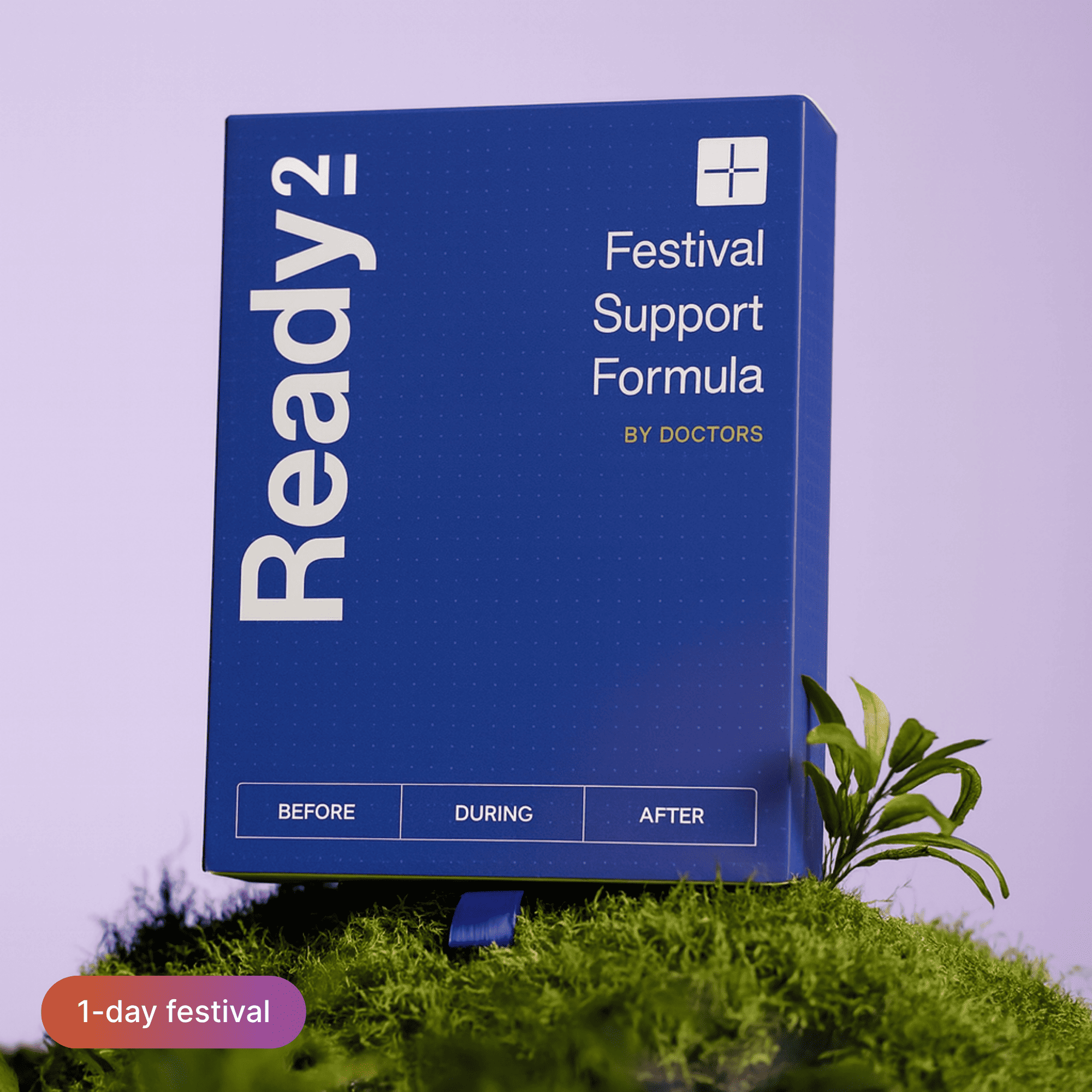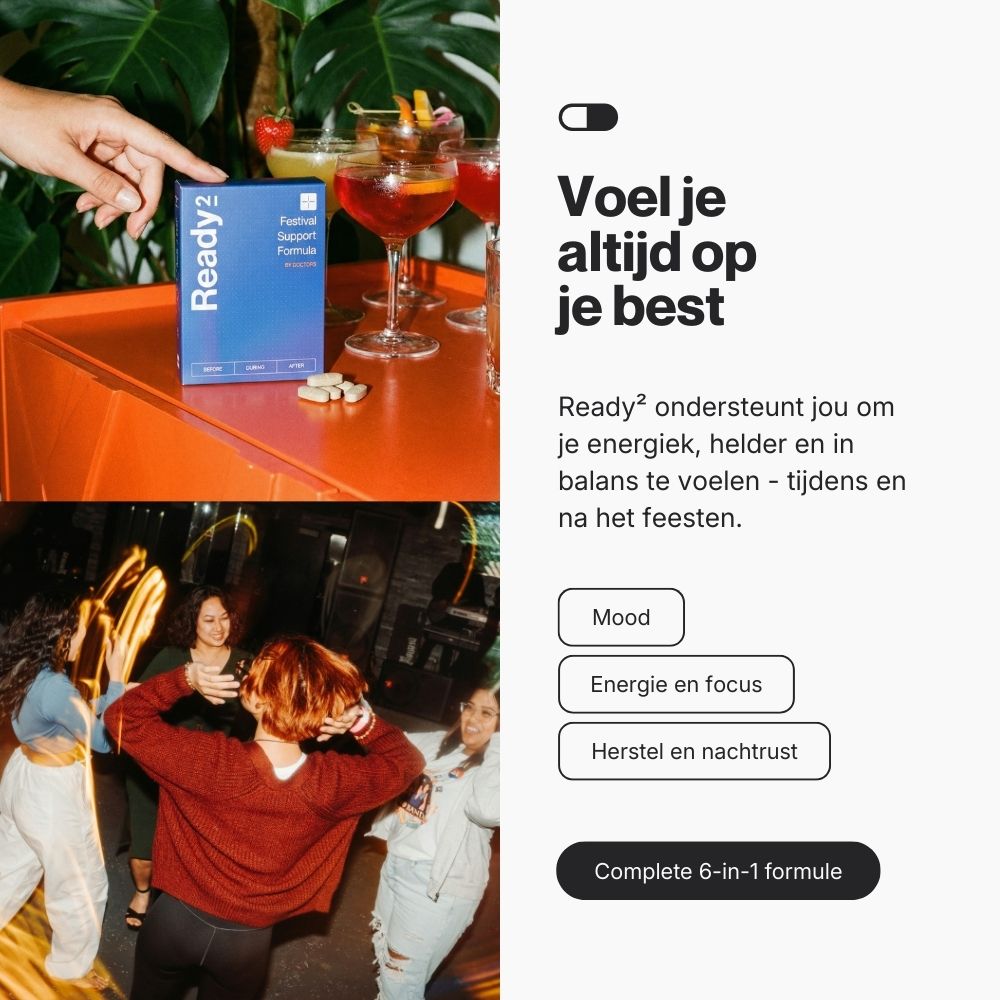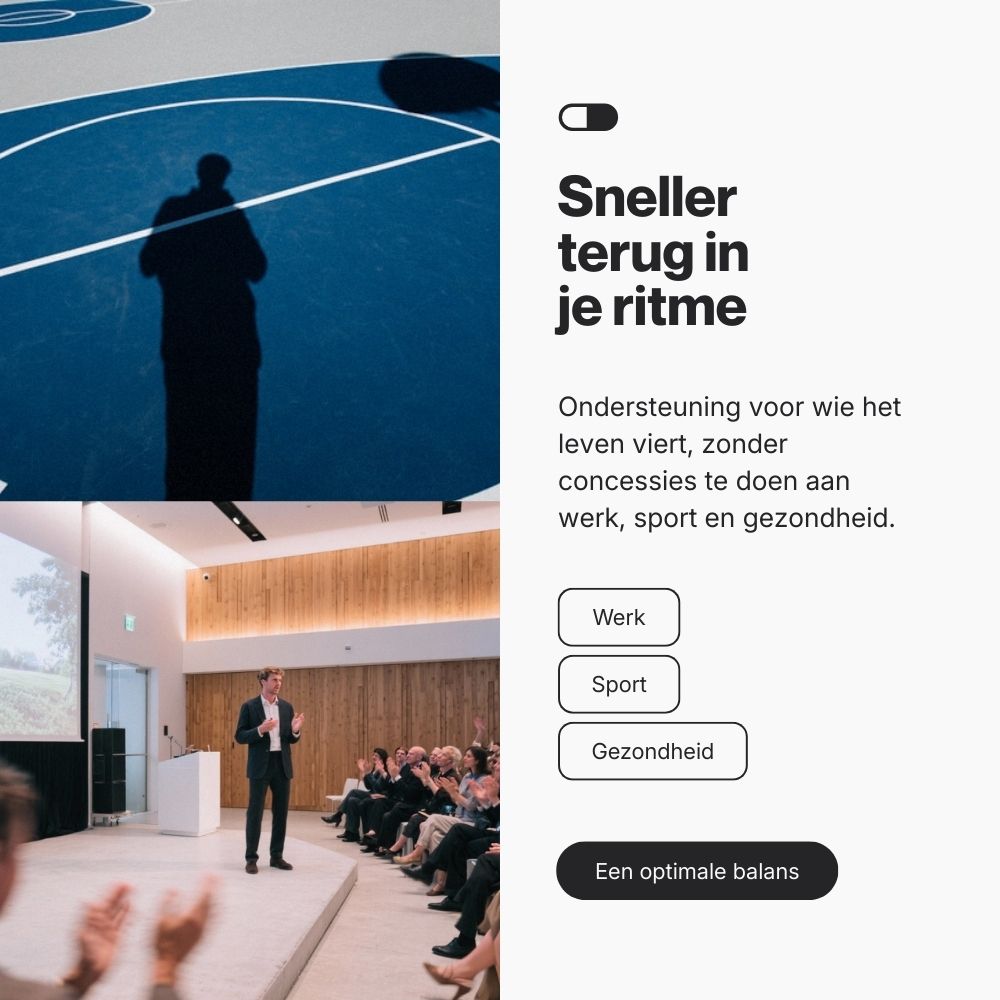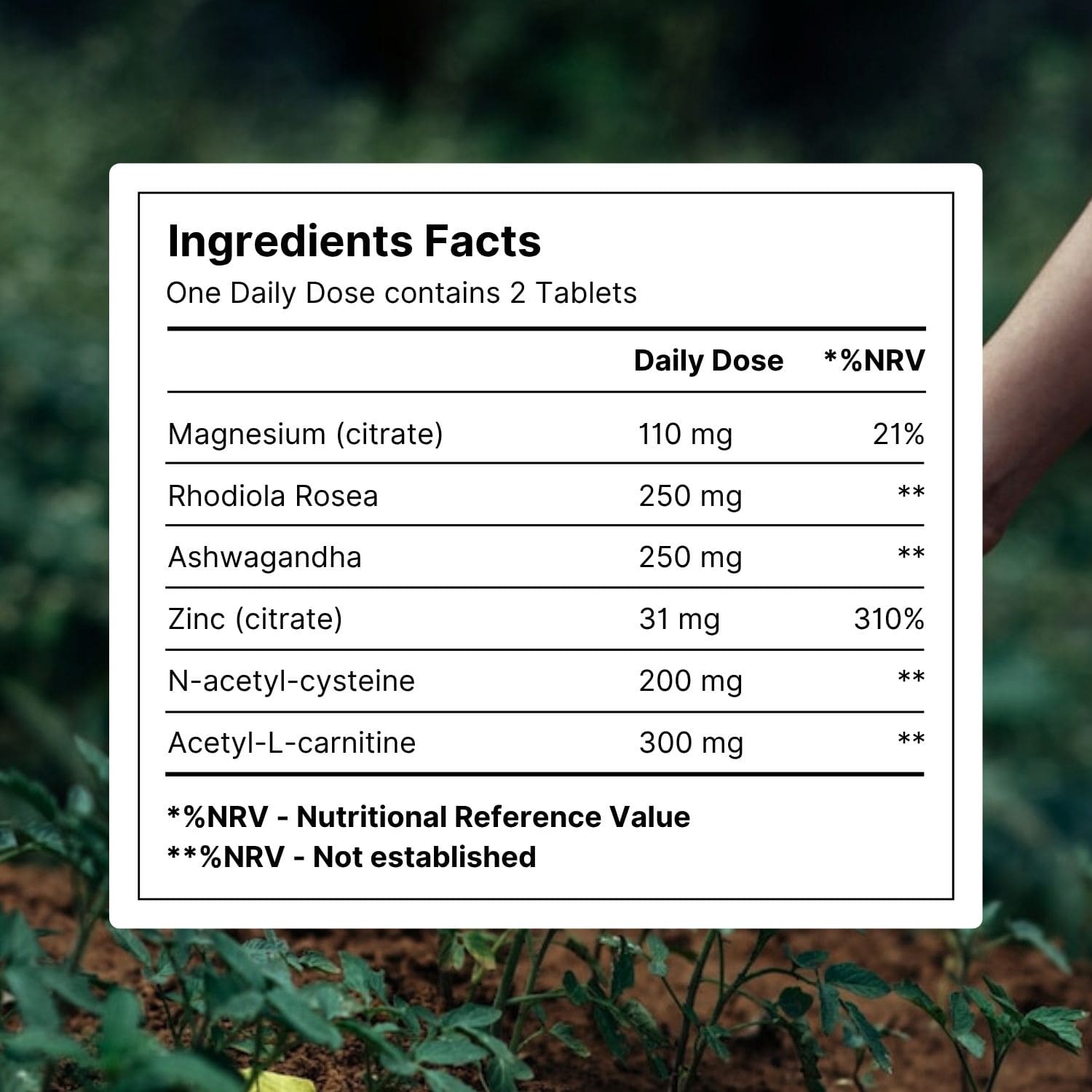
- by Ready2 Team
The ultimate festival preperation
- by Ready2 Team
Festivals are no longer a sideshow – they are part of modern life, a temporary break from reality where friendships deepen and memories are made. However, these multi-day events are an intense trial for both body and mind, with effects that can be felt long after the final performance. To fully enjoy the experience and recover quickly, a phased preparation is essential. In this comprehensive guide, we explore how you can prepare and support your body and mind in the critical days surrounding a festival. We combine scientifically-backed advice on nutrition, training, and recovery with practical, immediately applicable tips. Furthermore, we highlight the role of Ready2, a supplement specially designed for festival-goers, focusing on cognitive, physical, and metabolic support.
Exercise: focused on resilience and endurance
Generally, it is advisable to engage in cardiovascular training three days a week and strength training or fitness 2-4 times a week. The week before a festival is no different, and it is certainly wise to keep your body active. A combination of strength training (2-3 times) and cardio (1-2 times) is ideal. This not only increases your strength but also your muscle endurance – something you will need during long periods of standing, dancing, and few moments of rest. Furthermore, you also improve insulin sensitivity and recovery capacity, allowing you to better handle nutrition and stress. Two days before the festival, it is advisable to go easy on your legs: avoid heavy squats, sprints, or stair climbing. Instead, opt for light cycling or a short mobility session. This gives your muscles time to start the festival fresh, without stiffness or muscle soreness. Gently stretching your lower back and calves beforehand can also be very helpful for some.
Mental preparation: plan smart, prevent overstimulation
Festivals are rich in stimuli: loud music, large crowds, physical exertion, and irregular eating and sleeping patterns. Good mental preparation begins with reducing stress in the days leading up to the event. Plan demanding work or personal commitments early in the week, so you have space for rest and relaxation on the days just before the festival. Do you have children, (co-)parenting responsibilities, or a busy social life? Consider consciously clearing your schedule in the last 48 hours before the festival. An extra day off beforehand – even if it's just a morning or an afternoon – can also provide peace of mind. A good night's sleep (at least 7–8 hours) with consistent bedtimes and wake-up times contributes to your emotional stability and resilience on the day itself. If necessary, use routines such as warm showers, screen breaks, meditation, and quiet evenings to put your body into recovery mode. Of course, this is easier said than done, but some awareness and a few good habits can go a long way! Extra tip: prepare your festival outfit and the bag with your belongings in advance. You might also want to plan your pre-party ahead of time, giving you something enjoyable to look forward to all week without having to worry about festival logistics. See our festival checklist to ensure you don't forget anything.
Nutrition: nourish your system, build reserves
Nutrition forms the basis of your physical and cognitive functioning. Leading up to the festival, it is important to tailor your nutrition to your body's needs. As a general guideline, aim for approximately 30–40 kcal per kilogram of body weight per day. This should include about 1–2 grams of protein per kilogram of body weight, 3–5 grams of carbohydrates per kilogram of body weight, and 0.5–1 gram of fat per kilogram of body weight. If you prefer fewer carbohydrates and more fats, that is not an issue as long as the total calorie count remains roughly the same. Spread your intake throughout the day, with an emphasis on whole foods such as oatmeal, rice, legumes, eggs, yogurt, fruit, vegetables, nuts, and fish. These not only contain macronutrients but also micronutrients like magnesium, B-vitamins, and antioxidants, which are relevant for nerve conduction, energy production, and muscle recovery. By investing in nutrition beforehand, you build physical resilience that will serve you well during the festival. Also, see this article for a more comprehensive overview of nutritional advice.
The day before the festival serves as a transition point: you reduce the load on your system, but you do activate the processes that support your endurance, focus, and recovery capacity. Think of it as the final check before a marathon – only here, the finish line is the afterparty. In terms of exercise, opt for a restful day. Consider a short walk, some stretching exercises, or a gentle yoga session. These forms of movement activate blood circulation without unnecessarily stressing your muscles or nervous system. Nutrition remains similar to your normal requirements, or slightly above. Ensure a substantial, balanced meal in the evening – for example, with whole grains, lean proteins, and cooked vegetables. Avoid alcohol, heavy meals, and excessive salt. Take 2 capsules of Ready2 with your breakfast or lunch on this day. This supplement supports energy metabolism, contains adaptogens such as rhodiola and ashwagandha, and includes micronutrients aimed at supporting cognitive clarity and endurance. By starting the intake a day in advance, you build up a buffer in your ability to handle stress.
On the festival day itself, everything comes together. A stable energy base, a well-hydrated body, and an alert brain make the difference between a smooth experience and an overstimulating or exhausting day. Start the day with a meal rich in complex carbohydrates, healthy fats, and proteins. Think of oatmeal with nuts and fruit, whole-wheat bread with egg, or a smoothie with plant-based protein and avocado. Drink at least 500 ml of water before leaving. Take 2 capsules of Ready2 1 to 2 hours before departure with some food. The ingredients support concentration, cognitive flexibility, and physical endurance – qualities you will need during prolonged exposure to stimuli, lack of sleep, and physical exertion. Bring nutritious snacks (if allowed) such as nut mixes, bananas, or muesli bars. Keep your hydration levels up by drinking a little water every hour throughout the day, even if you don't feel thirsty. If possible, use an electrolyte drink without added sugars. Don't forget your earplugs!
The day after the festival, your body is busy recovering on multiple levels: sleep deprivation, disturbed hormone balance, dehydration, muscle fatigue, and increased oxidative stress. A structured recovery day helps to speed up this process. Limit physical exertion to a gentle 30-minute walk. Avoid intensive exercise and focus on blood flow and mobility. This helps with the removal of waste products and stimulates the parasympathetic nervous system (rest and recovery). Nutrition remains based on the guidelines from the preparation week, but give extra attention to easily digestible foods. Think of cooked vegetables, broths, rice, eggs, yogurt, or smoothies. Avoid heavily processed or fatty foods – your intestines may be temporarily more sensitive. Again, drink plenty of fluids (at least 2 liters) and possibly add magnesium or zinc. Take your third dose of Ready2 (2 capsules) in the morning or afternoon of the recovery day. This helps to replenish vitamins and antioxidants and supports cognitive and physical recovery processes that were disrupted during the festival. Go to bed on time and, if possible, sleep in a bit on Sunday and Monday. Extra tip: if your voice is sore from shouting, have some tea with honey or a few lozenges.
On the second and third day after the festival, you can start with light training – for example, a 30-minute full-body workout combined with 15 minutes of light cardio. This increases blood flow, improves insulin sensitivity, and stimulates muscle recovery without overstressing your system. Mentally, it is a good idea to postpone demanding cognitive or social obligations until mid-week or the end of the week. If you have the space, plan to take the Monday after the festival off. This reduces the chance of “festival blues,” concentration problems, or insomnia. Also, see our article for a more detailed explanation of how to deal with all kinds of symptoms on the days after a festival. Pay attention to your body's signals: are you easily irritable, tired, or chaotic? Then you are not yet fully recovered. Keep your diet nutritious, with an emphasis on fiber-rich carbohydrates, proteins, and fats from whole sources. Good sleep, consistency in rhythm, and moderate exposure to screens will help bring your system back into balance.
Festivals are more than just fun – they are also a significant strain on your body and mind. By investing in nutrition, exercise, mental rest, and the right supplement like Ready2 beforehand, you can optimize your performance and shorten your recovery. Treat your festival like an athletic performance: prepare yourself, support your system where necessary, and give yourself the space to recover.
Last but not least, it is very important to educate yourself on the the risks with festivals and learn ways to take care of yourself in a durable way:






Our medical team designed Ready² to support your body and mind during and after intense days or festivals. So you will feel like yourself much quicker and skip those horrible mondays.
This product contains 6 tablets for 3 doses.
Share:
The best diet before a festival
5-HTP after XTC?